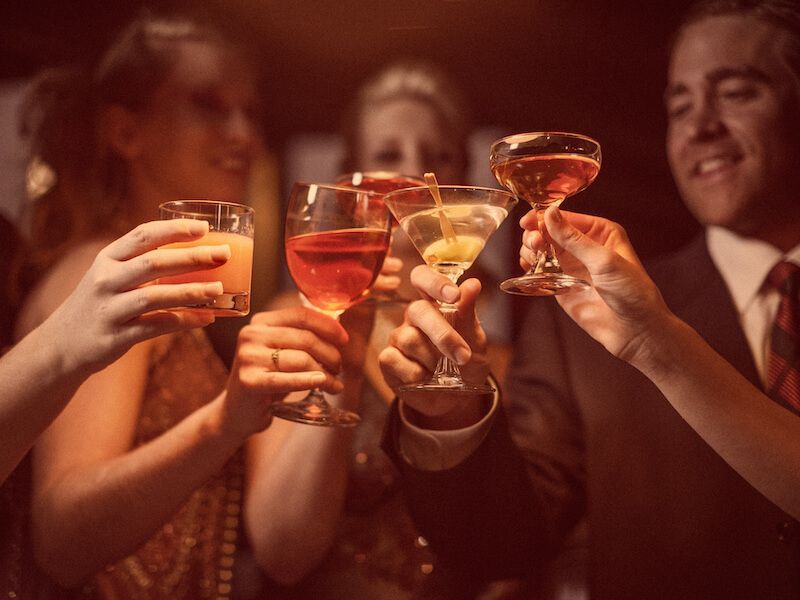Your Tinnitus Might be Getting Worse Due to Those Late Night Bar Visits

Remember the old tale of Johnny Appleseed? In elementary school, you may have been taught that he migrated across the United States, bringing the gift of healthy apples to every community he paid a visit to (the moral of the story is that apples are healthy, and you should eat them).
Actually, that isn’t the entire truth. Around the end of the 19th century, Johnny Appleseed (John Chapman was his real name) did in fact present apples to many parts of the United States. But apples were very different way back then. They weren’t as sweet or delicious. In truth, they were mostly only used for one thing: producing hard cider.
Yup, every neighborhood that Johnny Appleseed visited received the gift of booze.
Humans have a tricky relationship with alcohol. On the one hand, it’s horrible for your health (you will often experience some of these health issues immediately when you feel hungover). Conversely, humans generally like feeling intoxicated.
This habit goes back into the early mists of time. Humanity has been imbibing since, well, the beginning of recorded history. But if you’re dealing with hearing issues, including tinnitus, it’s likely that your alcohol use could be generating or exacerbating your symptoms.
So when you’re at the bar, loud music isn’t the only danger to the health of your hearing. It’s also the cocktails.
Drinking triggers tinnitus
The fact that alcohol causes tinnitus is something that hearing specialists will usually confirm. That isn’t really that hard to believe. If you’ve ever partaken of a little too much, you might have encountered something known as “the spins”. When you’re dizzy and the room seems like it’s spinning after drinking this is what’s called “the spins”.
When alcohol interferes with your inner ear, which is the part of your body responsible for balance, tinnitus can manifest.
And what else is your inner ear used for? Obviously, your ability to hear. So if alcohol can produce the spins, it’s not difficult to believe that it can also generate ringing or buzzing in your ears.
Ototoxic compounds, including alcohol, will cause tinnitus
The word ototoxic might sound daunting, but it just indicates something that can be damaging to your hearing. The whole auditory system from your ears to your brain is included in this.
Here are a few ways this can play out:
- There are neurotransmitters in your brain that deal with hearing which can be harmed by alcohol. This means that, while the alcohol is in your system, your brain isn’t functioning effectively (obviously, decision-making centers are affected; but so, too, are the portions of your brain in charge of hearing).
- The blood flow in your ear can also be decreased by alcohol. This alone can become a source of damage (most parts of your body don’t particularly enjoy being deprived of blood).
- Alcohol can degrade the stereocilia in your ears (these are fragile hairs that let you sense vibrations in the air, vibrations that your brain later translates into sound). Once those tiny hairs are compromised, there’s no coming back.
Drinking-related hearing loss & tinnitus aren’t always long-term
You might begin to notice some symptoms when you’re out on the town having some drinks with friends.
These symptoms, thankfully, are normally not permanent when related to alcohol. As your body chemistry returns to normal, you’ll likely start to recover some of your hearing and your tinnitus will decline.
But the longer you have alcohol in your system, the longer your symptoms will last. And it could become irreversible if this kind of damage keeps happening repeatedly. In other words, it’s definitely possible (if not likely) that you can generate both permanent tinnitus and hearing loss by drinking too much and too often.
Here are some other things that are happening
It isn’t just the booze, of course. The bar scene is not favorable for your ears for other reasons also.
- Alcohol leads to other problems : Drinking is also bad for other facets of your health. Diabetes, cardiovascular disease, and high blood pressure can be the result of alcohol abuse. And all of these issues can inevitably be life threatening, as well as contribute to more significant tinnitus symptoms.
- Noise : The first is that bars are usually, well, loud. That’s part of their… uh… charm? But when you’re 40 or older it can be a bit much. There’s much fun and merriment, people yelling, and loud music. Your hearing can be damaged over time by this.
The point is, there are serious risks to your health and your hearing in these late night bar trips.
Does that mean it’s time to stop drinking?
Of course, we’re not suggesting that drinking alone in a quiet room is the answer here. It’s the alcohol, not the socializing, that’s the root of the issue. So if you’re having trouble moderating your drinking, you could be creating significant problems for yourself, and for your hearing. You should consult your physician about how you can get treatment, and start on the path to being healthy again.
If you’ve detected a loud ringing in your ears after heavy drinking, make an appointment with us for a consultation.
Call Today to Set Up an Appointment
Start Your Journey To Better Hearing Today
Kankakee, IL
1455 W. Court St.
Kankakee, IL 60901
815 939 2024
Mon & Wed: 9am-4:30pm (Staff only)
Tue & Thu: 8:30am-5pm (Doctor sees patients)
Fri: 9am-1pm (Staff only)
Fri: 2pm-5pm (Doctor sees patients)
Closed for lunch 12pm-1pm
Steger, IL
29 West 34th St.
Steger, IL 60475
708 756 1767
Mon & Wed: 8:30am-5pm (Doctor sees patients)
Tue & Thu: 9am-4:30pm (Staff only)
Fri: 8:30am-12pm (Doctor sees patients)
Fri: 1pm-4:30pm (Staff only)
Closed for lunch 12pm-1pm


